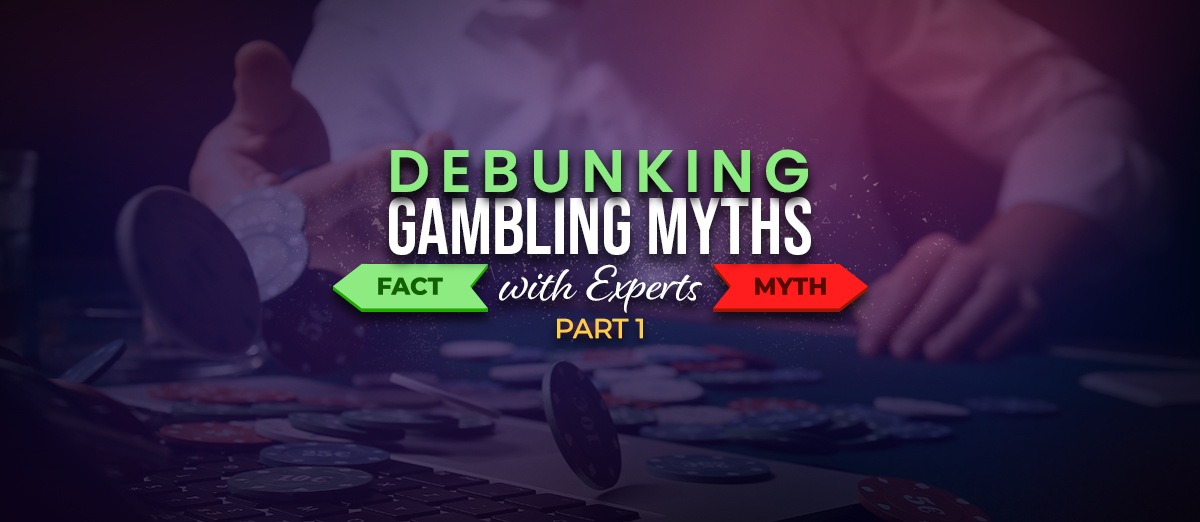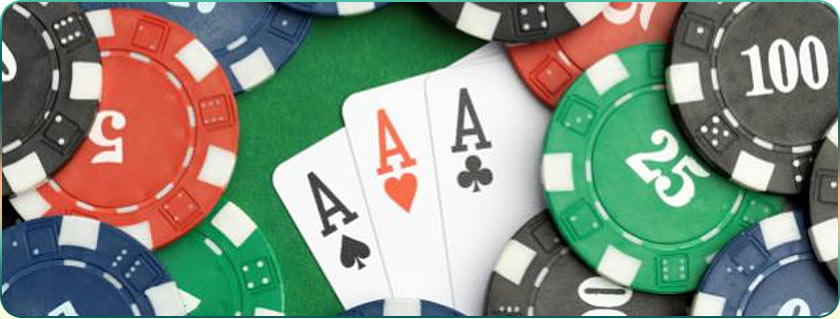Gambling Experts Bust Wide Open the Most Common Casino Myths: Part 1

Let's play a game of 'Mythbusters', gambling edition, a two-part series where we pull back the curtain on some of the most popular gambling myths. From counting cards to ideas around gambling addiction, we've heard it all. But how much of it is rooted in fact? Well, that's what we're here to find out!
The world of gambling is a glittering mix of chance, thrill, and strategy, but lurking behind the glitz are countless casino myths. Can you really sway Lady Luck to favor your hand, or is that just an illusion spun by hopeful hearts? Does the 'weak-minded' stereotype surrounding gambling addiction hold up under scrutiny, or is it high time we busted that myth?
Now, we wouldn't want you to take just our word for it. Oh no, we've brought in the big guns! Meet our myth-debunking squad: Tadas Peckaitis, the poker maestro, ready to deal out facts and debunk fiction; Catalin Barboianu, our gambling mathematician, who can crunch numbers like a pro at a roulette table; and last but not least, Catherine Lyon, a victorious warrior against gambling addiction who's turned advocate and spends her days championing responsible gambling.
So, buckle up, dear readers. We're about to embark on a wild ride through a maze of myths, guided by our trio of experts. We promise you intrigue, insights, and perhaps a few surprises. Stay tuned, because 'Mythbusters: CasinoReviews Edition' is officially in play!
Myth 1: Card Counting Is Illegal
Tadas: False. Let’s bust this gambling myth from the get-go by saying that card counting is absolutely legal. There have been many court decisions over the years stating that card counting is not illegal, so there is nothing to be afraid of.
On top of that, you do not need any extra tools or software to count cards while playing and can do all of the calculations in your head, so it would be really hard to categorize it as cheating.
Since blackjack is one of the most favorable games for the player, with just a 0.5% house edge when played perfectly, it is not hard to see how even a small advantage of counting cards can make this game profitable for the players.
Since land-based casinos do not want you to gain any additional advantage, they will do what they can to prevent it, and they did a good job in that, to say the least. Casinos frown upon this practice and can even ban you if they notice suspicions play from your part.
That said, they came up with way more effective ways to address card counters. They introduced multi-deck games and now reshuffle the entire stack so often that counting cards do not give you any advantage. In the live casino sector, you will find each hand starting with an entirely random deal, meaning that counting cards have no merit there, either. So while card counting is legal, there is no real use case for it anymore.
Myth 2: Gambling Is an Easy Way to Get Rich
Catalin: False. Literally speaking, gambling is a possible way to get rich, in the sense that big wins are always possible and that way is accessible to everybody. However, ‘possible’ does not mean ‘probable’ and something possible might not even happen during one’s lifetime.
Some players got rich by gambling, and we are always fascinated by their stories: progressive jackpots, lottery jackpots, or poker tournament wins in the order of millions or tens of millions. Such a story is not a story about a winner themselves but is the story of gambling. Whatever the dose of any kind of skill of the winners, there is eventually a chance that drove the winning outcome for them.
The ‘disappointing’ feature of gambling with respect to chance is that the fact that big winners exist does not entail that you will be one of them sometime after “hard work.” The outcomes of gambling occur cumulatively and not individually – the winners exist just because there are many people playing a certain game, and the probability for a winning outcome to occur gets materialized when that number of players is large enough; it’s in the statistical nature of gambling. However, the odds are always against the players and playing against the odds is an uncomfortable way itself of making money.
Generally, gambling is not like investing in a business, just because it carries other risks besides losing the invested money. It’s about the risk of developing an addiction, with consequences that may affect the health and social life of the problematic gambler.
Therefore, if gambling is a way to get rich, it is not at all an easy clear one. It is a time- and resources-consuming risky way of getting rich, for which you don’t even have the certitude that the final aim will be attained during your lifetime. Gambling is worth trying only if you don’t draw yourself big objectives like getting rich or making a living from it and you are prepared enough to confront the associated risks.
Myth 3: The House Always Wins
Catalin: True. If you imagine all past, current and future players in a casino as one "collective player" against the house, the sentence above is true. Casino games are so constructed to give overall profit to the house over the long run. The statistical indicator called house edge expresses this overall profit as a percentage of all players’ wagers, and a positive house edge is a mathematical guarantee for the house that they will always be in profit over the long run, no matter the number of players and the strategies they may use.
But house edge is a statistical average, like other indicators such as expected value, RTP, variance, and so on. This means that percentual profit does not materialize for the house from one player’s session, nor in one or more days, but cumulatively over the long run. As such, there might be days when the house is in loss (for instance, when a jackpot has been paid out) and one or more players achieved big wins. They beat the house that day, but the math says that they cannot beat it over the long run, except when leaving after a big win that covers previous losses.
In conclusion, the house doesn’t always win against individual players, but it always wins against the collective player and against one individual over the long run. Chasing isolated wins can be a responsible strategy itself, but it has its own risks and is relative to the player’s personal goals and gambling behavior.

Myth 4 : Gambling Addiction Only Affects the Weak-Willed or Unintelligent
Catherine: False. Throughout my journey, I have encountered numerous myths about problem gambling and full-blown gambling addiction.
Years of advocacy work, mentoring, and supporting individuals in early recovery have taught me that addictive gambling can, and indeed will, affect individuals from all walks of life, regardless of their background or status. It knows no boundaries, impacting both the young and old, the wealthy and less privileged, the highly educated and those without formal education, and people in various professions.
In the initial stages of my recovery, I actively participated in Gamblers Anonymous, where I had the privilege of meeting and assisting a diverse group of recovering gamblers. Among them were firefighters, lawyers, doctors, teachers, parents, grandparents, seniors, teenagers, young adults, and even myself, having spent 21+ years in the banking industry. This experience reinforced the fact that gambling addiction can truly touch anyone's life.
Certain factors may act as precursors to potential gambling problems. Growing up in a family of problem gamblers, working in the gambling industry, or constant exposure to gambling environments can make someone more susceptible to issues with gambling later in life. Additionally, untreated mental health issues can also increase the likelihood of encountering difficulties related to gambling. Being aware of these factors is crucial in addressing and preventing the destructive consequences that gambling addiction can bring.
Myth 5: Poker Is a Game of Luck, Not Skill
Tadas: False. Many players love to debate that poker is mostly luck since they can easily justify losing repeatedly without actually looking at their play. However, it is clear without a doubt that poker is primarily a skill game.
You see the same players year after year battling at the highest stakes, winning tournaments, and reaching the final tables of huge events, which would not be possible in a game based on pure luck.
Of course, there is an element of luck in the short term. Almost anyone can win a separate hand or even a tournament, which gives an illusion of poker being more luck than skill for an untrained eye.
The most talented and famous gamblers in the world spend hundreds of hours studying and finetuning their strategies, working with dedicated software to understand other players' ranges, and analyzing their games. If skill did not matter, that would be a waste of time, but somehow these players end up being the biggest winners in the games.
It is also common to compare poker to other casino games like slots or roulette, which are actually luck-based since you do not influence anything. On top of that, you are playing against the casino, which always has an edge, so you will lose in the long run, no matter what. In poker, you are playing against other players rather than the house, and the best players win more often than not.
So, to end the debate once and for all, we can say for certain that poker is a skill game with an element of luck in the short term. Anyone can get lucky and win for a while, but the best players will always prevail over extended periods.
Myth 6: You Can’t Become Addicted to Something like Gambling
Catherine: False. Regrettably, this misconception holds no truth. The reality is that excessive indulgence in anything, be it coffee or sugar, can pave the way for addiction. The same holds for gambling, as it acts as a stimulant, triggering our brain's pleasure and reward system. My personal journey with gambling began as a mere issue, spending too much time and money on it occasionally. However, before long, it escalated into a full-fledged addiction within a span of one to two years.
While most individuals can engage in gambling for a few hours of leisure and amusement, my experience led me down the path of a gambling addict due to various underlying reasons. Throughout my treatment and therapy sessions, I came to realize that I was using gambling as a coping mechanism and an escape from the haunting traumas of childhood, such as sexual abuse and pain.
Shockingly, statistics show that one in five problem gamblers might attempt suicide. I can attest to the validity of this fact, having endured two failed suicide attempts before seeking help from a gambling treatment program. My road to recovery involved spending 30 days in a crisis center on two separate occasions.
Data from The North American Foundation for Gambling Addiction Help reveals that approximately 2.6% of the U.S. population faces gambling-related problems due to frequent gambling habits. It is essential to recognize these statistics as they shed light on the widespread impact of gambling addiction on our society.
Myth 7: If You Keep Playing the Same Slot Machine, It Will Eventually Pay Out
Catalin: True. But bear in mind that it is not a payout itself as an event that you should aim at, but to have an overall profit over that session, and this amounts to the length of the losing streak.
Every unlucky spin costs you credits and the loss cumulates until the winning spin. Would you be happy if you eventually hit a winning combination, but the payout does not cover your previous total loss? For having a profit, the payout should exceed that cumulated loss, and that depends on the prize you won, that is, how high in the payout schedule that winning combination is ranked. On the other hand, your bankroll should be large enough to sustain a long losing streak. This stands for any game of chance.
No information about a machine will tell you for how long you should play it before it pays out. All statistical indicators of a slot game – if available – are statistical averages and not arithmetical. If a machine has a 95% RTP, this does not mean that it will pay back 95% of your credits during your session or over one week or a month, but it will pay all players cumulatively, over the long run, from all players’ credits.
Even the volatility of a machine won’t tell you when you should expect it to pay out. Low-volatility machines pay out more often and in lower prizes than high-volatility machines, however, this degree of frequency is still statistically averaged over the long run.
After all, outcomes are determined by the RNG, which works randomly. The frequency of wins is related to the probability of each winning combination, but the probability is – again – an infinite average and cannot predict when precisely a win will occur. It is possible, although improbable, that a machine won’t pay out for thousands of spins ahead or more.
Keeping playing the same machine does not guarantee hitting a win within a certain timeframe or after a certain number of spins. Changing a machine does not change your luck, as every spin is independent of each other. Also, you don’t have to be upset when someone hits a win at a machine you were just leaving.
The RNG works also when the reels do not spin and generates thousands of numbers per second, of which only one determines the outcome before you press the spin button.

Conclusion
Roll credits on Part 1 of debunking popular gambling myths - it's a wrap! Let's recap: the idea of gambling as a swift road to riches? That's more myth than reality. Sure, we've all heard the tales of players hitting the jackpot, but these are mostly down to lady luck, not a foolproof strategy.
Gambling is a thrilling ride, but it does come with risks, from the potential for addiction to the possible impact on one's personal life and health. The notion that a slot machine is 'due for a payout'? That's another myth. Each spin is an independent event, unaffected by the ones before it. Even the most calculated betting systems can't promise victory in games of chance like roulette.
Let's not forget, problem gambling doesn't discriminate. It can cause significant harm, regardless of one's starting point. The key is to know the real score when it comes to gambling and to be aware of the potential pitfalls.
That's it for now, but don't go too far! In part two, we'll return with our expert panel to debunk even more common gambling myths. Stay tuned!






